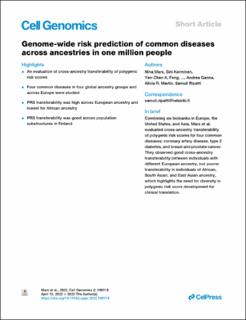Genome-wide risk prediction of common diseases across ancestries in one million people
Mars, Nina; Kerminen, Sini; Feng, Yen-Chen A.; Kanai, Masahiro; Läll, Kristi; Thomas, Laurent Francois; Skogholt, Anne Heidi; della Briotta Parolo, Pietro; Neale, Benjamin M.; Smoller, Jordan W.; Gabrielsen, Maiken Elvestad; Hveem, Kristian; Mägi, Reedik; Matsuda, Koichi; Okada, Yukinori; Pirinen, Matti; Palotie, Aarno; Ganna, Andrea; Martin, Alicia R.; Ripatti, Samuli
Peer reviewed, Journal article
Published version

Åpne
Permanent lenke
https://hdl.handle.net/11250/3068300Utgivelsesdato
2022Metadata
Vis full innførselSamlinger
Sammendrag
Polygenic risk scores (PRS) measure genetic disease susceptibility by combining risk effects across the genome. For coronary artery disease (CAD), type 2 diabetes (T2D), and breast and prostate cancer, we performed cross-ancestry evaluation of genome-wide PRSs in six biobanks in Europe, the United States, and Asia. We studied transferability of these highly polygenic, genome-wide PRSs across global ancestries, within European populations with different health-care systems, and local population substructures in a population isolate. All four PRSs had similar accuracy across European and Asian populations, with poorer transferability in the smaller group of individuals of African ancestry. The PRSs had highly similar effect sizes in different populations of European ancestry, and in early- and late-settlement regions with different recent population bottlenecks in Finland. Comparing genome-wide PRSs to PRSs containing a smaller number of variants, the highly polygenic, genome-wide PRSs generally displayed higher effect sizes and better transferability across global ancestries. Our findings indicate that in the populations investigated, the current genome-wide polygenic scores for common diseases have potential for clinical utility within different health-care settings for individuals of European ancestry, but that the utility in individuals of African ancestry is currently much lower.
